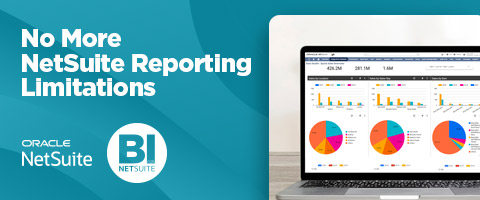Table of Contents:
- Challenges with NetSuite Data
- Best Practices in Data Integration for NetSuite and Google BigQuery
- The Solution: GURUS Business Intelligence for NetSuite (BI4NetSuite)
In today's data-driven world, businesses are constantly seeking ways to streamline their operations and make data-informed decisions based on their unique industry needs.
Whether it be a CFO regularly delivering customized P&L data to the company’s Board of Directors, or a Chief Experience Officer (CXO) seeking to develop KPI scorecards to improve customer churn, the rigid design of ERP systems point to data warehouse solutions to address these challenges.
Unfortunately, exchanging data between an ERP system and a data warehouse requires an intimate knowledge of the ERP’s data schema to effectively build a powerful data model aligning with an organizations' reporting needs.
Request More Info About NetSuite ERP to Google BigQuery Data Warehouse
Challenges with NetSuite Data
Most organizations underestimate the effort required to build a powerful data warehouse solution mining the valuable ERP data captured in NetSuite along with other core enterprise systems critical to their business.
Although Google BigQuery provides a powerful data warehouse available in the Cloud, a successful solution for customers running NetSuite faces a specific set of challenges unique to the NetSuite platform.
At a high level, here are the three main challenges a NetSuite-BigQuery integration project faces:
Data Synchronization
One of the primary challenges is ensuring smooth and accurate data synchronization between NetSuite ERP and Google BigQuery by building an integration platform designed to transform ERP data into a more flexible and usable format in the data warehouse.
NetSuite may have custom data structures, while BigQuery requires a specific data format for efficient querying. Mismatched schemas and complex transformations can lead to data integrity issues and hinder the integration process.
Data Volume and Velocity
NetSuite ERP can run into performance limitations in handling large volume data sets. It’s not uncommon to run a high volume saved search with limited joins and have the system time out. Managing the continuous flow of data from NetSuite to BigQuery without overwhelming system resources poses a significant challenge.
Data Transformation and Cleansing
NetSuite ERP and BigQuery store data in different formats and structures. Transforming and cleansing the data during integration is necessary to ensure consistency and accuracy. However, performing complex data transformations while maintaining performance can strain system resources and cause delays in data availability.
Best Practices in Data Integration for NetSuite and Google BigQuery
Ensuring a successful integration between NetSuite ERP and a Google BigQuery data warehouse requires a careful plan in designing, building and maintaining an optimized NetSuite data model mixing both customized views and raw data tables documented for consumption.
The idea is to deliver a more flexible and robust access to NetSuite data along with other potential data sources that can be leveraged by popular data visualization tools, such as Looker Studio, Microsoft Power BI and Tableau Software (among others).
A robust NetSuite data model built for Google BigQuery should incorporate the following features:
Standardized Data Mapping
Establishing a standardized data mapping process between NetSuite and BigQuery is essential. This involves defining and mapping the data fields, ensuring consistency in data formats, and resolving any discrepancies in schema structures. Using ETL (Extract, Transform, Load) tools or leveraging a middleware platform with a pre-built data model designed for NetSuite ERP can simplify this process.
Batch Processing and Incremental Updates
To handle the high volume and velocity of data in NetSuite ERP, organizations should employ a batch processing approach. Rather than processing data in real-time, data can be extracted from NetSuite at regular intervals and loaded into BigQuery ensuring data accuracy for optimal use.
Implementing incremental updates ensures that only new or modified data is transferred, reducing the processing load and improving efficiency typically seen with poorly designed data warehouse solutions.
Data Transformation Optimization
To optimize data transformation and cleansing, organizations should seek cloud-based data integration tools or services designed to address the unique data challenges with NetSuite ERP. These tools can offer advanced transformation capabilities, or in some cases, deliver a pre-built data model that can be customized to a company's business requirements while offloading the processing load from local systems. Leveraging these tools helps maintain data accuracy and improve overall system performance.
The Solution: GURUS Business Intelligence for NetSuite (BI4NetSuite)
The integration of NetSuite ERP with Google BigQuery Data Warehouse powered by GURUS Solutions’ BI4NetSuite opens up new possibilities for organizations to unlock the full potential of their data. With seamless data integration, a pre-built data model, advanced analytics and reporting capabilities, scalability, and robust data security, GURUS’ Business Intelligence for NetSuite solution empowers businesses to make informed decisions based on accurate, up-to-date information.
By harnessing the power of NetSuite ERP and Google BigQuery, organizations can gain valuable insights, drive operational efficiency, and achieve a competitive edge in today's data-centric business landscape.
Learn More About NetSuite ERP to Google BigQuery Data Warehouse

